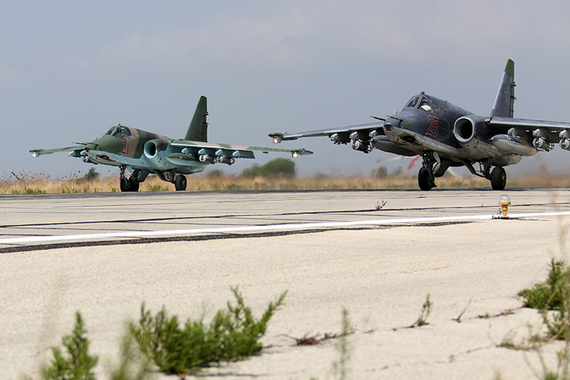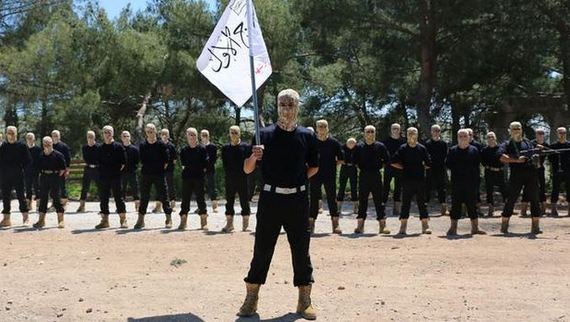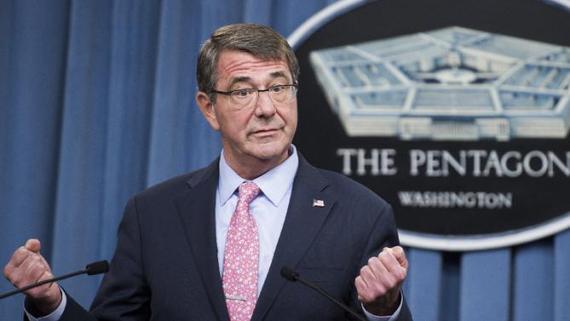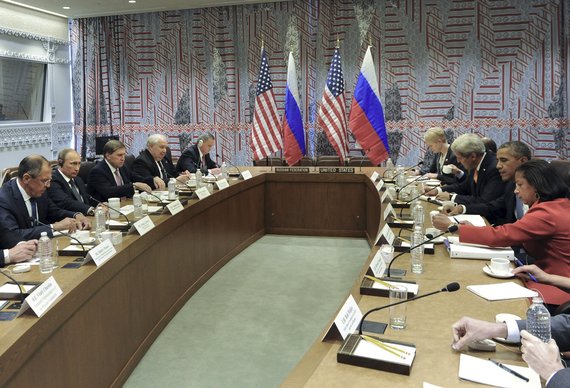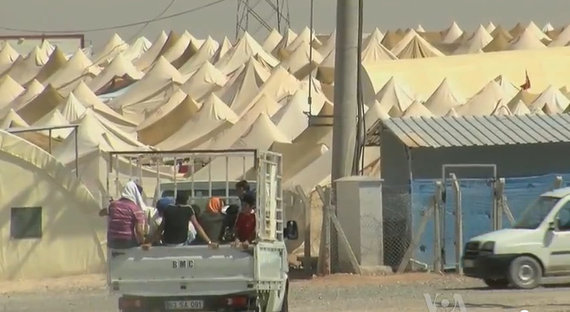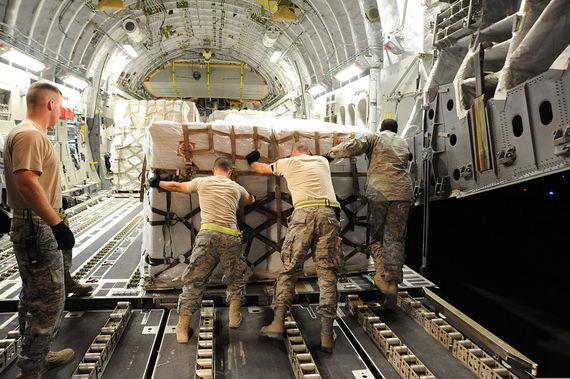The Syrian Civil War is entering a third and potentially very dangerous phase in its continuing evolution. It began as a purely domestic crisis, became steadily internationalized as other countries intervened, and it now risks becoming a full blown Russian-American cold war proxy conflict. This is a conflict that could turn hot very quickly given the proximity of American and Russian military forces in the same theater of operations.
The civil war started as an Arab Spring sparked revolt by elements in the Syrian military, under the banner of the Free Syrian Army, against the Assad government. There has been a widespread and sustained opposition to the Assad regime in Syria by Sunni citizens and especially the Muslim Brotherhood over the last 50 odd years. Each instance of revolt was met by brutal, overwhelming force from Damascus.
The civil war quickly became internationalized. Iran rushed to support its Syrian ally. Other Arab Sunni governments led by Saudi Arabia and Turkey, fearful of the growing spread of Iranian influence in the Middle East and recognizing that the Assad government was a linchpin in Tehran's Shiite "arc of influence" that stretched across Iraq, Syria, Lebanon, and Gaza, also intervened with supplies and money for Assad's opponents.
Over the course of 2013, a series of anti-Assad jihadist organizations, starting with the al-Qaeda and Islamic State of Iraq supported al-Nusra Front, emerged in Syria. Many of these organizations, their radical jihadist orientation notwithstanding, received support from a variety of Arab sources in the Gulf, both governmental and private.
The emergence of the Islamic State, first in the chaos of Syria and then its expansion into the Sunni triangle of Iraq, raised the stakes even higher. Until then, the United States had largely stayed out of the Syrian Civil War. The threat of IS destabilizing Iraq raised new complications, created both political and strategic problems for the Obama administration, and prompted an American intervention. Dubbed operation "Inherent Resolve," Washington recruited a broad coalition of Arab and European allies to being a targeted air campaign against the Islamic State in Syria.
Up until then, the Russian government had been supplying weaponry, financial, and diplomatic support to the Assad government but had not been otherwise directly involved. In September 2013, in response to charges that the Syrian government was deploying chemical weapons against its own citizens and in order to preempt any American response, the Kremlin offered a diplomatic solution under which the United Nations would supervise the securing and subsequent destruction of Syria's chemical weapon stockpile. Since then, Moscow has been growing increasingly vocal in its support of the Assad regime.
Over the month of September 2015, Russia disclosed that it had transferred two squadrons of Sukhoi fighter jets to the Basel al-Assad military base in Latakia, Syria. Satellite reconnaissance later confirmed that modular housing, sufficient for some 2,000 military troops, was being assembled at the air base. In addition, additional construction was observed in Tartus where the Russian navy maintains its only foreign naval base. The presence of fifteen Mi-17 and Mi-24 attack helicopters were also confirmed as well as the arrival of two tank transport ships. Those ships were believed to each be carrying 25 Russian tanks, approximately 500 naval marines as well as assorted heavy artillery and transport including armored personnel carriers.
On September 28th, following their respective speeches to the U.N. General Assembly, Vladimir Putin and Barack Obama held a private 90 minute meeting at U.N. headquarters in New York City. The White House described the meeting as "productive" and "business like". Unconfirmed Kremlin sources however described the meeting as "tense" and claimed that Putin told Obama that the American strategy to combat Islamic State in Syria had failed, that it would precipitate another "Libya" and that the Islamic State would not be defeated without "boots on the ground". According to the same Kremlin source, Putin again pressed Obama to join with Russia in a "grand coalition" to defeat Islamic State.
On September 30, Russia began an air campaign over Syria targeting a broad array of anti-Assad groups. Although the Kremlin continued to insist that its primary target was Islamic State militants and continued to call for a "grand coalition" against the Islamic State, the bulk of its attacks were directed against Free Syrian Army positions and against groups that were being supported by the U.S. and its Arab allies.
On Friday October 2, President Barack Obama declared that the conflict in Syria was not a "superpower chessboard contest." White House Press Secretary Josh Earnest went on to add that the Obama administration was exercising "strategic patience." A longtime critic of Washington's Mid-East policy, a former, high ranking, Carter administration official, translated "strategic patience" as "we're clueless."
On Oct 3 and 4, as if to deliberately underscore Washington's impotence, Russian aircraft twice violated Turkish airspace. It is not surprising that a pilot engaged in air combat or attempting to avoid a missile might inadvertently cross into a neighboring country's air space. It is highly unlikely, however, that a Russian pilot on a routine mission who was not under attack or facing an external threat would have made such an error. Russian pilots are highly trained professionals, they simply do not accidently violate neighboring air space unless they have an equipment malfunction or are deliberately told to do so.
Secretary of Defense Ashton Carter confirmed that the Russian violation "was no accident" and has repeatedly condemned the Russian action. In the meantime, other than for criticizing the Russian actions, calling it a "fundamental mistake," and for directing U.S. warplanes to divert their flight paths to stay at least 20 nautical miles away from Russian aircraft, the Obama administration has not otherwise responded to Russian actions. It is unclear whether Russian pilots have also been told to keep a 20 nautical mile buffer zone from American and coalition aircraft.
On October 5, the Kremlin disclosed that "Russian volunteers" would be allowed to go to Syria and fight on behalf of the Syrian government. Subsequently, the Kremlin denied that additional Russian troops would be deployed in Syria and, just to make sure that the West recognized the linkage of the Ukrainian crisis with the one in Syria, that the "Russian volunteers" might be coming from those currently in the Ukraine. Two days later, On October 7, Syrian army units, supported by Russian air power and a cruise missile bombardment from Russian ships in the Caspian Sea, began a ground offensive in Syria's Hama and Idlib provinces. Both provinces have historically been hot beds of opposition to the Assad government and the FSA has a prominent position there. There is little if any Islamic State presence in either of the two provinces.
For Russian president, Vladimir Putin, the Syrian Civil War has become the nexus where he can most leverage Russia's strengths to achieve his political and economic goals. Simply put, Syria offers the Kremlin an opportunity to accumulate chips that it can cash in other negotiations. Although Russian aims and tactics will be largely opportunistic, the Kremlin has four broad objectives it is looking to achieve from its Syrian intervention.
First and foremost, in shoring up the Assad government Moscow is sending a clear message to the Middle East and to the rest of the world that it is prepared to stand by its allies and to commit its military forces to insure their survival. That lesson will not be lost on countries like Egypt, Saudi Arabia, or elsewhere in the Gulf that are growing uncertain about the reliability of American guarantees. By eliminating Assad's opponents, Moscow can re-legitimize the Assad government by presenting the West with a stark choice: either support Assad or support Islamic State.
Moreover, Russia's military presence in Syria now gives it the ability to intervene elsewhere in the Middle East. There are already tentative indications that Russian air power may be deployed in support of the Iranian backed Shiite militias in Iraq. Syria may well be just the beginning of a broader Russian intervention of military force across a number of Mid-East conflicts.
Additionally, by aligning itself with Iran and the rest of the "Shiite bloc," Russia is accelerating the growing realignment of Mid-East politics around a Sunni-Shia pole. In doing so it is also leveraging its influence and taking advantage of Iranian proxies in the region to further isolate American influence and expand its own.
To be sure, American military power in the region dwarfs anything that the Russians have mustered, but the Russian presence and the Kremlin's willingness to use its otherwise modest forces will rewrite the military equation in the Middle East. By intervening in Syria, Russia has assured itself of a seat at the bargaining table over the future of Syria specifically and in the other, invariably cross-linked, issues of the Middle East.
Secondly, although Russia is not a member of OPEC, despite repeated attempts to join, its role in Syria gives it valuable bargaining chips in its dealings with that organization and with Saudi Arabia and its Gulf allies. Oil is critical to Russia's future. Natural gas and petroleum exports are responsible for 68% of Russia's export revenues and 50% of the government's budget. Simply put, the future of Russia rises and falls with the price of hydrocarbons.
Russia needs higher energy prices, so too, for that matter, do the Saudis and their Gulf partners. The ability of the Saudis and their allies to tolerate low oil prices exceeds that of Russia, however, especially a Russia that is subject to economic sanctions from Europe and the United States. Concessions on oil pricing and production might well be a quid pro quo for some role for the Saudi backed Syrian rebels in whatever negotiated solution emerges. Thirdly, and most significantly, Russia needs relief from the sanctions imposed by the EU and the United States. Russia's potential ability to stem the flood of refugees leaving for Europe could turn out to be a valuable bargaining chip in the Kremlin's quest for sanctions relief. So also will its role in combatting jihadist violence in Syria and in helping to curtail the flow of jihadists into Europe. The Kremlin has made a point of underscoring the links between resolving the crisis in Ukraine and resolving the one in Syria.
Finally, there is the ongoing issue of Ukraine and the general issue of NATO's eastern expansion and the buildup of NATO and U.S. sponsored military assets in Eastern Europe. The potential tradeoffs of Western support for Kiev against Russian concessions in Syria is not lost on Ukrainian president Petro Poroshenko who has expressed his concern that European and American support for his government may get sacrificed as part of a larger deal with Russia over Syria. East European governments, privately, have been expressing the same concerns fearful that their long-term security and NATO support may be traded for Russian concessions elsewhere.
The United States now finds itself in a difficult position in Syria. American supported rebels are coming under direct attack by Russian military forces. If the U.S. challenges Russian planes it risks a potential escalation and a military incident between American and Russian forces. Worse, it risks being branded as the aggressor and the party responsible for escalating the Syrian conflict into a dangerous new level.
To date, U.S. air forces have mostly concentrated on hitting Islamic State targets. There has been little effort to directly support ground operations by the Free Syrian Army or other rebel groups. With the exception of the defense of Kobani, and a number of other Kurdish led operations, American air power has generally not coordinated its activity with those of anti-Assad rebels. For the U.S. to now come to the defense of those rebels would be seen as an expansion of the American role in Syria and as a direct provocation to the Russians.
On the other hand, if the U.S. fails to respond to Russian attacks on its "quasi-proxies," it risks being seen as impotent, unwilling to stand by its allies, and will effectively cede leadership over resolving the Syrian crisis to the Kremlin.
One option would be to step up military support for the Ukrainian government, increasing the number of U.S. military trainers there and even considering rotating American aircraft and troops there so as to establish a continuous military presence. Neither the White House nor NATO has much appetite for stepping up their presence in the Ukraine, however.
In the broad sweep of history what happens to Bashir al-Assad will scarcely warrant a footnote. There is no question that his attempt to retain power with Russian and Iranian support will continue to rain death and destruction on Syria and propel even more Syrians to seek asylum in Europe. Russia's military intervention will complicate the conduct of U.S. foreign policy in the Middle East, create new strains with long standing allies, and add even more byzantine complexity to an already complex, if not incomprehensible, situation.
On the other hand, the dramatic image of the Kremlin flexing Russian military power in the region notwithstanding, the fact remains that the United States is still the world's reigning superpower and Russia, for all its newfound aggressiveness, is not. America still has the world's largest, most advanced and dynamic economy and while it has no shortage of significant problems to deal with it also has the ability, with the right leadership, to overcome them.
Russia on the other hand is locked into a long-term terminal decline, one that will likely see its collapse and further breakup in another generation or two. Putin's opportunistic foreign policy and his ability to manipulate the world's media may create the illusion of the restoration of a bipolar world but the reality of Russia's declining economic base coupled with a shrinking population say otherwise.
For the last several years, the Obama Administration's policy in Syria has been little better than a poorly thought out PR campaign. Spread a few billion dollars here and there, drop some supplies to a few rebel groups, launch a lackluster air campaign, and continue to declare that you are winning. Critics of that strategy, admittedly it is a bit of a stretch to call it a strategy, were summarily dismissed by an administration that continues to believe they are the smartest guys in the room and that anybody that disagrees with them is hopelessly deficient.
Putin's masterstroke was in realizing that by intervening in Syria he could gather up some valuable chips that he could use in other negotiations and at the same time embarrass the Obama White House by demonstrating how ineffectual President Obama's policy in Syria had become. In addition, it allowed him to break out of the diplomatic isolation that Washington had tried to impose on him and restore his relevance on the world stage. He has been able to cast an image of himself as a strong and forceful leader and portray U. S. president Barack Obama as indecisive and ineffectual. In the long run none of this will really matter, but in the short run it is a significant diplomatic victory for the Kremlin.
The United States had a tough hand to play in Syria and the White House played it poorly. The Russians had an equally tough hand, maybe an even harder one, and they played it brilliantly. That is the reality of the situation in Syria today as the civil war enters its fifth year.
Great powers make mistakes. Indeed, given the scope of their interests it is inevitable that great powers will make many mistakes. Though as embarrassing or expensive as such mistakes can be, they are rarely of existential consequence. No great power, however, can afford to be made to look irrelevant. That is precisely what Vladimir Putin has done to Barack Obama in Syria and all of the spin from the White House and its apologists in the media will not change that basic fact.

